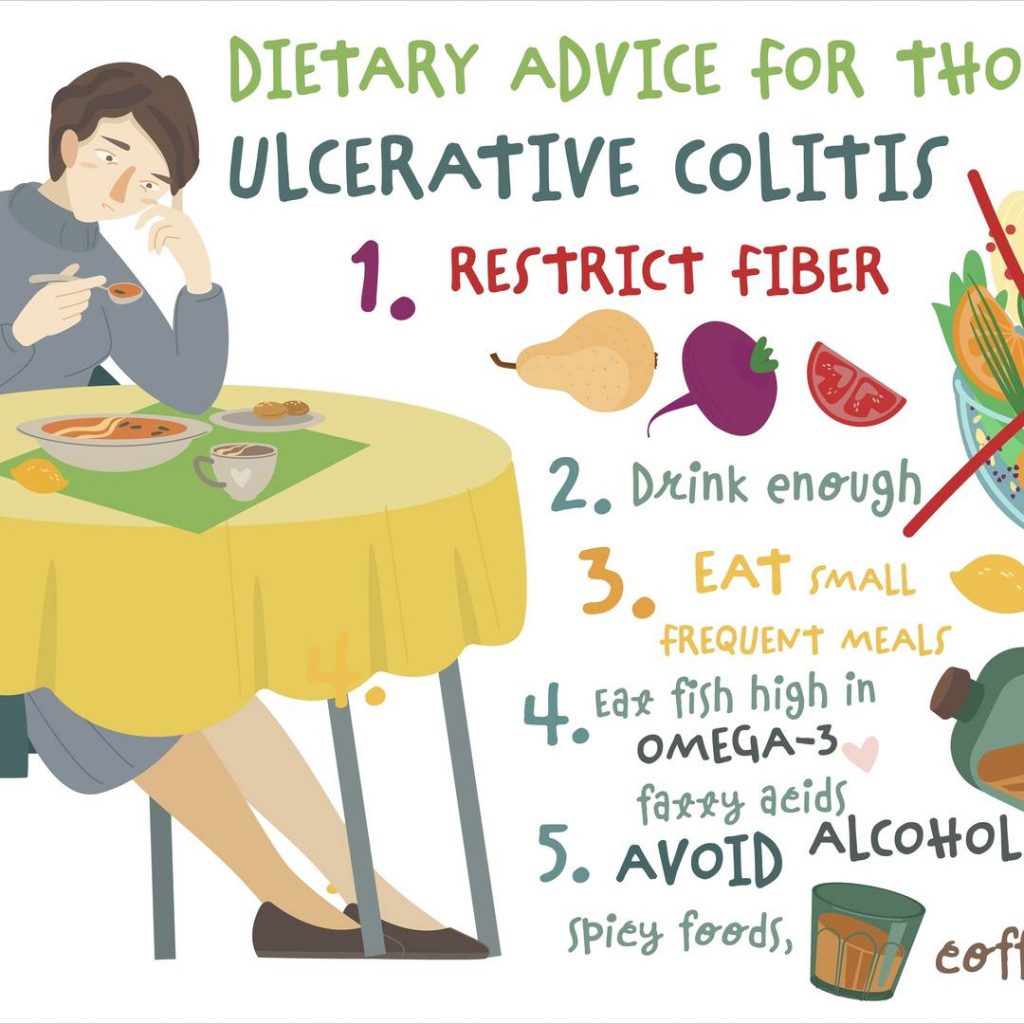
Foods For Colitis Prevention
Ulcerative Colitis (UC) is one of the common conditions under the Irritable Bowel Syndrome (IBD) umbrella. Colitis causes inflammation of the colon, which makes it hard to digest food properly. It comes with a range of symptoms and affects overall quality of life if left untreated.
Related Topics (Sponsored Ads):
The sooner you treat your Colitis, the better off you’ll be. Letting it go for too long can lead to a slew of health issues and complications, such as developing chronic fatigue, damaged immune system, an increased risk of colorectal cancer, an increased risk of Osteoporosis, a danger of miscarriage and other pregnancy – related problems, and toxic megacolon. There are medications, surgeries and treatments that can help treat and manage colitis symptoms, but there are also common and easy to find foods that can significantly help if your case of colitis is mild-moderate.

Foods to Avoid
Before we jump into the best foods that help relieve and keep colitis symptoms under control, there are some foods that you should minimize as much as possible, because they cause inflammatory flare-ups and aggravate your symptoms.
● Alcohol
● Caffeine
● Carbonated drinks
● Dairy products, if you’re lactose intolerant
● Dried beans, peas, and legumes
● Dried fruits
● Foods that have sulfur or sulfate
● Foods high in fiber
● Meat
● Nuts and crunchy nut butters
● Popcorn
● Products that have sorbitol (sugar-free gum and candies)
● Raw fruits and vegetables
● Refined sugar
● Seeds
● Spicy foods
Your doctor or a certified dietitian are great resources to help you figure out what foods work best for you. Keep them in the loop on how you feel and what you eat. They can answer your questions and help you get the nutrition you need. Foods don’t actually cause Ulcerative Colitis disease, but they can help manage it or make it worse.
If you struggle to eat healthy and nutritionally balanced foods due to personal taste or your required dietary restrictions, you might need to take supplements like calcium, folic acid, and vitamin B12. Ask your doctor if you need to add certain essential supplements to your plan.
You may also find that you do better with several smaller meals throughout the day instead of three big ones. When you make your diet plan, think about foods that you can carry with you for healthy snacking. Your dietary plan will inevitably change over time, and no diet fits all with colitis. That’s why it’s important to keep a food diary to help you figure out what’s good, what isn’t, and help you stay on track.
So, what can help fight off an awful and painful colitis flare up? Keep on reading to learn and find out.
Applesauce
Since your gastrointestinal system experiences a lot of irritation during a flare, you may want to stick to soft, easily digestible foods like applesauce. Be sure to choose an unsweetened variety though, because added sugar can cause more inflammation. You can also make your own sugar-free applesauce by cooking peeled, sliced apples with some water and then pureeing the mixture.
Ripe Bananas or Canned Fruits
Although dietitians generally recommend avoiding raw fruits during a flare, very ripe, soft bananas are often well tolerated by Colitis patients. Bananas are also a good source of carbohydrates, which, along with protein and fats, provide energy. In addition, soft fruits like canned pears or peaches may not be irritating, according to Shannon Szeles, RDN, from York, Pennsylvania.
Cooked Vegetables
Soft, cooked veggies like carrots and spinach can provide important nutrients, such as vitamins A and K. Just make sure the vegetables are thoroughly cooked— until they can be mashed with a fork. In this way, any potentially irritating fiber is broken down.
Salmon Or Other Fish Rich In Omega-3 Fatty Acids
If you have UC, are lactose intolerant or simply want to get more protein in your diet, simply add salmon to the foods you eat during a flare. In addition to being a great source of protein, salmon has healthy omega-3 fatty acids that may help reduce inflammation. If you don’t like salmon, you can also eat tuna, shrimp, or other fish that are high in omega-3 fatty acids. All these fish are great choices.
Neilanjan Nandi, MD, a gastroenterologist and assistant professor at Drexel University College of Medicine in Philadelphia, recommends baking, broiling, or sautéing salmon rather than frying it. According to Nandi, frying fish causes it to lose a lot of its nutritional value.
Yogurt
If you’re not lactose intolerant, yogurt can provide you with some protein and probiotics, which are live bacteria that may help the digestive system. Be sure to buy yogurt that says live and active cultures on the label. Avoid yogurt that contains large chunks of fruit, which could be hard to digest. However, It should be fine if the yogurt has fruit that’s soft, seedless, and well blended in. Probiotic supplements are also an option if you are lactose intolerant.
White Rice With Turmeric
If you can’t tolerate most foods during a major flare, you may want to stick with bland choices, such as cooked white rice. If you want to add flavor, try sprinkling it with turmeric, a yellow spice whose key ingredient, curcumin, has shown some benefit in the treatment of ulcerative colitis.
A meta-analysis published in November 2019 in the Annals of Gastroenterology found that taking curcumin along with an anti-inflammatory was better for treating ulcerative colitis than only taking an anti-inflammatory medication by itself.
Final Thoughts
UC can be debilitating and painful, and can even be life threatening if left untreated for an extended length of time. But with proper and prompt treatment, you will be able to reduce the symptoms, improve your quality of life and keep it from getting worse.
As with any medical or health related treatment, always refer to a certified doctor or dietician before making any changes.




